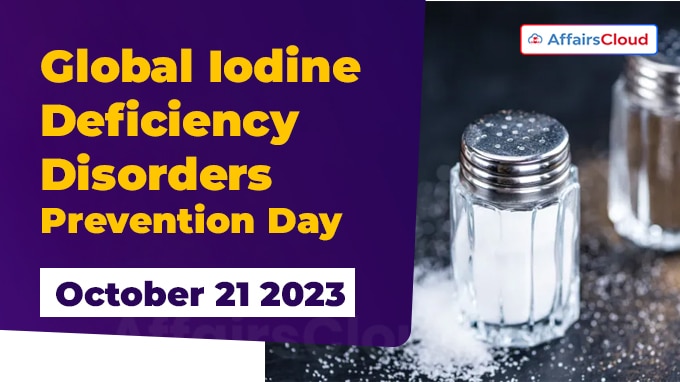 Global Iodine Deficiency Disorders(IDD) Prevention Day or World Iodine Deficiency Day is annually observed across the globe on 21st October to create awareness about the importance of Iodine, an essential micro-nutrient.
Global Iodine Deficiency Disorders(IDD) Prevention Day or World Iodine Deficiency Day is annually observed across the globe on 21st October to create awareness about the importance of Iodine, an essential micro-nutrient.
Iodine and its importance:
i.Iodine is a mineral that is found mainly in animal protein and sea vegetables and, to a lesser extent, in fortified foods like bread, cereals, and milk.
ii.Iodine is required to make the thyroid hormones thyroxine and triiodothyronine, which assist with the creation of proteins and enzyme activity, and regulate normal metabolism.
Source of Iodine:
i.Iodine is present naturally in soil, seawater, and in some foods.
ii.The content of iodine in food depends on the amount of iodine in soil, the proximity of seawater, farming practice
Note: The Recommended Daily Intake (RDI) of iodine is 150 micrograms (mcg) per day for most adults.
Iodine Deficiency Disorders:
i.Iodine Deficiency Disorders (IDD) refers to the full clinical spectrum of disease caused by iodine deficiency.
ii.Inadequate intake of iodine will affect the production of thyroid hormones which will affect the muscle, heart, liver, kidney and the developing brain.
iii.Iodine deficiency is a leading cause of preventable brain damage worldwide.
- Insufficient iodine during pregnancy and infancy results in neurological and psychological deficits
- This will reduce a child’s Intelligence quotient (IQ) by 8 to 10 points.
iv.IDD which can begin in the womb, pose a grave threat to children’s mental health and, in many cases, affects their very survival.
v.During the neonatal period, childhood, and adolescence, IDDs can lead to hypothyroidism and hyperthyroidism.
IDD Prevention in India:
i.The National Iodine Deficiency Disorders Control Programme (NIDDCP) is a government initiative launched in 1992 to address the widespread issue of iodine deficiency in India.
- It is the extended version of the program National Goitre Control Programme (NGCP) which was launched in 1962.
ii.The National Iodine Deficiency Disorders Control Programme (NIDDCP) aspires to achieve a prevalence of iodine deficiency disorders (IDDs) below 5% in India.
iii.Additionally, the programme aims to ensure that every household in the country consumes adequately iodized salt containing 15 parts per million (ppm) of iodine.
Iodised salt:
In an effort to promote the use of iodized salt, the Government of India (GoI) implemented a ban on the sale of non-iodized salt for direct human consumption in India, effective from May 2006.
- This measure was enacted under the Prevention of Food Adulteration Act 1954.




